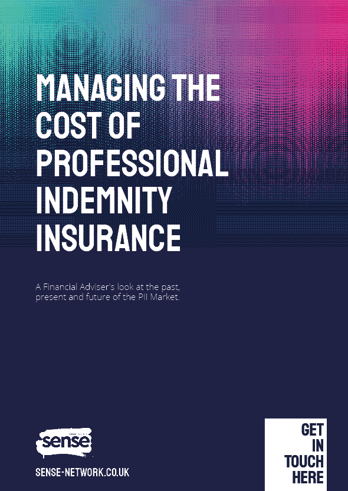 The adviser firms we work with tell us is that managing the cost of PI cover in a very difficult market is an important priority.
The adviser firms we work with tell us is that managing the cost of PI cover in a very difficult market is an important priority.
By way of context, it is first worth looking at the most prominent factors which will have contributed to the current challenges in the PII market.
The insurance market is most significantly influenced by insurers’ view of risk, with premiums also affected by supply and demand. Historically, there were many more insurers willing to provide PII cover to UK markets, leading to greater price competition. However, the conditions which drove this 'soft market' have changed and increasingly we have found ourselves in a 'hard market', driven by a reduction in the supply of PII cover caused by the withdrawal of most providers from the sector and a reduction in risk appetite from those remaining.
Although the reasons that insurers have withdrawn vary, there are some consistent issues which have, undoubtedly, contributed to the hardening of the financial services intermediary market:
Low rates of return
The soft market's price competition has reduced the return to insurers from professional indemnity policies even in good years. The nature of professional indemnity claims can lead very large losses. Combined with lower surpluses in good years, a bad year or even a small number of large claims can wipe out several years' profit.
The Lloyd's Review
In 2018 Lloyd's of London conducted a review of its worst performing lines of business. One of the areas identified as having claim pay-outs consistently exceeding premiums, was the PII market. For example, in 2017, the PII market received over £100m more in claims than was paid in premiums.
Lloyds requires insurers to achieve profitable underwriting margins and where this could not be demonstrated insurers were required to close their PII units.
Financial Services Compensation
In April 2019, the amount of compensation which the Financial Ombudsman Service (FOS) could award increased from £150,000 to £350,000 and widened the definition of eligible complainants to include more SME business. As of March 2022, this has now increased in line with inflation, to £170,000 and £375,000.
This resulted in a reduction in the number of insurers offering terms for financial services firms, and the cost of cover from the insurers that remained, significantly increasing. The FCA publishes data annually showing how premiums have increased.
Firms recently directly authorised (DA) will understand the difficulties in obtaining PII cover at this time. DA firms face a difficult task in trying to obtain cover in a ‘hard market' as there are limited insurers offering cover, whilst the insurers that remain are showing reduced capacity and appetite for PII business.
| Revenue | 2017 | 2018 | 2019 | 2020 | 2021 |
| £101k to £500k | 1.90% | 2.20% | 2.80% | 3.10% | 3.40% |
| £501k to £10m | 2.70% | 2.90% | 3.30% | 3.20% | 3.20% |
Sense firms’ premiums have reduced further since we moved to our current arrangement and remain well below market rates. Currently, contributions across the Network stand at an average of 1.65%, for compliant PII.
Sense firms have compliant cover, having seen no increase to excesses since we implemented this arrangement. PII excesses are:
- £2,500 for general insurance, non-investment insurance and mortgages
- £5,000 for pensions (including DB transfers) and investment products.
Why are we paying less?
Part of the increase in PII costs can be attributed to firms dealing in high-risk advice areas, such as Equity Release.
To avoid your PII costs rising exponentially, it benefits to be in partnership with a network that operates robust checks and compliance controls that make sure that the advice given is compliant.
Sense spent time working with our brokers to provide a bespoke arrangement which offers individual underwriting for each Sense firm, but with the costings of an umbrella policy. Our approach ensures that an individual firm’s risk will determine its PII cost and that there is no unfair cross subsidisation across the network. We believe that this creates a stable and sustainable PII structure.
Between 2021 to 2022 PII costs have increased by a further c5%. Firms that have joined us recently, having renewed cover for a directly authorised firm, will have most likely already have noticed this.
As demonstrated above, Sense Network AR firms have been in a better position than most others.
WHAT WE DID?
Most Networks have a single block PII arrangement which covers all advice provided by all their AR firms combined. Sense Network historically decided to structure its PII arrangement such that each AR firm has its own individual policy. The reason for this decision was that Sense wanted to avoid some AR firms cross subsidising PII costs for other AR firms.
This can happen as the underwriting assessment is undertaken on the consolidated data, which results in high-risk AR firms having a contagion effect on the overall arrangement.
Conversely, each AR firm having its own individual policy was not without disadvantages either. For example, each AR firm had to submit its own PII application, and each policy was subject to a minimum premium.
We therefore worked with our brokers in 2021 to move to a bespoke arrangement, which protected the benefits of our current structure and removed some of its disadvantages.
By rearranging the overall aggregate limit across all firms into a single policy in this way the arrangement has the following benefits:
- Reduced overall costs from an historic average of circa 2% - 2.15% of turnover to an overall network average (of firms with between 101,000 – 10m turnover) of 1.65%. This is still subject to individual underwriting at firm level so each ARs contribution will be calibrated by product spread and claims records to avoid unfair cross subsidisation.
- Compliant excesses as all firms will still benefit from the same £2.5k/£5k levels as their current policy has, which is again an area where we have seen upward pressure on in the market.
- Change to minimum premium Our minimum charges are now set at an annual cost of £2,100. It is worth noting that the minimum premium for directly authorised firms is circa £3,200.
Historically Sense Network has engaged the services of a broker and our PII was periodically subject to a tender process so that we could ensure that we had market leading cover at a competitive price.
Having considered all options available in the market, including our historic relationships we have decided to continue to partner with IFA Prosure (IFAP) under a ongoing contractual arrangement including an enhanced service level and a reduced fee agreement – which partly explains the improvement in premiums.

John Netting, a former Director and Owner of Sense Network, joined IFAP as a Director to support them in creating a new market leading PII proposition for the financial services sector. Due to our historic relationship, coupled with John’s understanding of our business and requirements,
IFAP have been in a unique position to help develop us a bespoke arrangement in a way which has never been available before.
We are extremely positive that continuing with this long-standing collaboration will be of benefit to all Sense Network firms and have already been impressed with the level of support and value that they have added in negotiating such an excellent arrangement.
You only need to read the trade press to know that Defined Benefit Transfers (DBTs) have caused widespread market turmoil with firms finding themselves unable to get PII cover at all or paying high premiums for non-compliant cover. Sense AR firms who historically transacted DBTs continue to be very well placed due to the block policy introduced in 2021.
This policy provides compliant cover with an aggregate level of cover that most firms could only look at with envy. This block policy for DB transfers will be renewed and will run in parallel as it does currently.
.jpg?width=290&name=aa%20SENSE%20(356).jpg)



